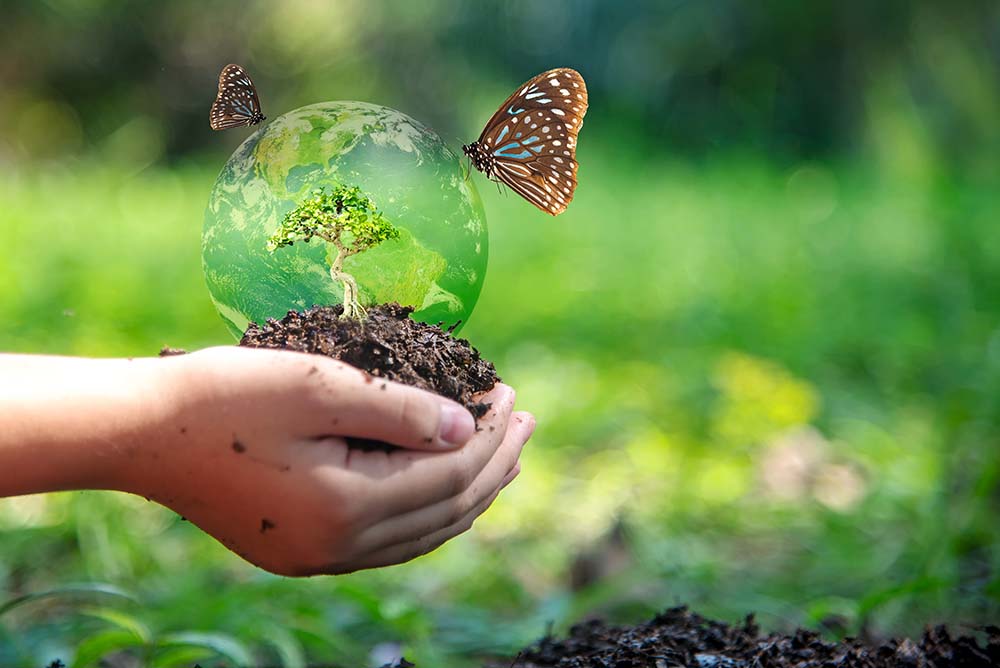When we think about the word ‘sustainability’, what pops into our minds is the wellbeing of the planet and saving it from the climate crisis which is worsening daily. And quite rightly so! After all, if the entire planet is facing impending doom because of excessive consumption, pollution and waste—apart from a myriad of other reasons—then the wellbeing of Earth does become a big priority for our survival. Yet, the fact is, the environment impacts our health, and in recent years, we have indeed seen just how much worse health issues have become because of the state our planet is in.
The thing is, with health issues—from obesity and heart disease to asthma and malnutrition—being related to environmental causes more and more now, a closer look at how we go about treating these health problems is important. Why? What if the course of treatment you use for your health issues actually worsens the state of the planet? The result would inevitably be that the cycle of degrading environment leading to an increase in health issues leading to more demand for treatments (which may be unsustainable) will continue. This is the vicious circle that the concept of sustainable wellbeing hopes to overcome.
Understanding Sustainable Wellbeing
According to a 2020 study published in the International Journal of Environmental Research & Public Health, sustainable wellbeing integrates the ideas of individual wellbeing and environmental wellbeing. “Sustainable wellbeing is achieved when improving individual wellbeing is correlated with improving the wellbeing of other members of society and the natural environment,” the study explains. The concept involves a framework where positive health education and environmental education are combined to explore and experience wellbeing that is sustainable for all.
This study and many other emerging ones suggest that sustainable wellbeing education should be imparted to people across all age groups, ethnicities and nations—and that it should involve not only activists, policymakers and adults, but also, and especially, children. By involving every human member of the biosphere in the process, the practices associated with sustainable wellbeing will have a broader, global impact that can not only help limit the climate crisis but also help humans create a better future.

How To Practice Sustainable Wellbeing
Sustainable wellbeing is all about analysing your lifestyle and creating new, long-term habits that are designed to support you as well as the environment, holistically. How to have a holistic wellness approach? You have to consider each area of your wellbeing, and correlate them with sustainable practices. The best way to begin is with small, incremental steps that help you get towards set goals. The idea is to progress steadily and surely, with consciousness about what you are doing. This, of course, does require professional support, so it’s best to sit down with your physicians, specialists and mental health professionals to cover every area. Making constructive changes in even one area of your wellbeing can actually help you can the confidence to impact all other spheres, making this healthy flow go from one area of your life to another, until you have an ecosystem of wellbeing that improves your life, that of your family and community, as well as that of the planet, ultimately.
Below are some of the key areas of sustainable wellbeing that you can start focusing on.
Physical And Environmental Wellbeing
Your physical wellbeing is most immediately associated with the environment around you, because this is the sphere where you live. Also, your physical wellbeing involves movement, for which your immediate environment needs to be ample, if not completely green and healthy. Here are some things you can do to become more physically and environmentally healthy:
• Spot gardens and parks near where you live, and take regular walks there. Studies show that walking amidst nature can improve your mental wellbeing while also keeping you physically fit.
• Turn the areas in and around your home more green and sustainable by planting trees and maintaining a balcony, terrace or yard garden. Gardening is a good physical exercise and can also help improve your immediate surroundings.
• Taking a daily walk for just 30 minutes can improve your health and keep you more connected with your surroundings as well as the ecosystem.
• If your walking area is safe and clean, try walking barefoot. This will connect you to the earth better.
• If you can grow some of your own foods, do so, even if you are only growing herbs on your window sill.
• Consume whole foods instead of processed and packaged ones, especially those sourced from local markets and farmers. This can not only improve your physical health, but also help sustain local food systems and farmers.

Emotional And Social Wellbeing
If you want to live a life which is in harmony with the planet and nature, then emotional and social wellbeing matter a lot. In fact, without emotional and mental wellbeing, your physical and other aspects of health are likely to be impacted as well. Your emotional wellbeing links to that of your family and social circle as well. So, taking care of your mental and emotional health can improve that of your social circle and keep you in sync with the planet as well. Here are some ways to start doing that:
• Take stock of your mental health and ask for professional help and familial support where needed.
• Increase interaction with members of your community, region and other social units. Increasing your social network will create systems of support you can rely on, and others can as well.
• Engage in a hobby that connects you with nature, like cooking sustainably, gardening, volunteering, etc.
• Listen to people in your family and community, especially when they raise concerns about mutual or collective wellbeing. Speak up about these issues and bring them to the attention of authorities and policymakers.
• Practice kindness and meditation.
Occupational And Financial Wellbeing
Finding a job that gives you personal satisfaction and takes care of your financial needs at the same time can be critical for your wellbeing, also because this aspect can help you manage other areas of your life. If your job does not provide you with either or both of these, it can impact all other spheres of wellbeing. Indirectly, it can also impact the amount of volunteer work you can do, the hobbies you can pursue, and your ability to support your family and community. So, occupational and financial wellbeing does play a critical role in your overall, sustainable wellbeing. Here are a few things you can do to ensure your occupational and financial wellbeing:
• Learn more about managing your finances, and rope in a professional if needed.
• Set realistic financial goals and learn to live within your means, but while ensuring you have emergency and retirement funds.
• Review your current job satisfaction level. Analyse how you can do better, set goals and follow through.

Intellectual And Spiritual Wellbeing
While physical, mental, occupational and financial wellbeing are all directly tied up to your overall wellness, one cannot ignore intellectual and spiritual wellness—especially where sustainable wellbeing is concerned. Nothing can improve your awareness, consciousness and contentment as much as intellectual and spiritual wellness can. Here are a few things you can do:
• Practice gratitude and forgiveness in your everyday life.
• Dive deeper into your passions and interests, especially if they involve people, communities and nature.
• Stay in the know about things happening in your immediate surroundings as well as the world. Make sure you gather your information from ethical and reliable sources.
• Increase your knowledge by engaging in fields you’re interested in. The process of education never stops, no matter how old you are.
• Teach or mentor the younger generation.
• Assist the older generations during their golden years.
• Practice journaling to build more self-awareness and spiritual awareness.
• Be kind to yourself and give yourself the permission to be happy even if the occasion is small.